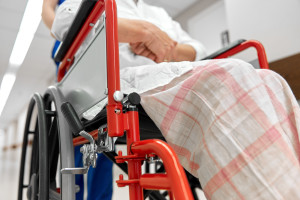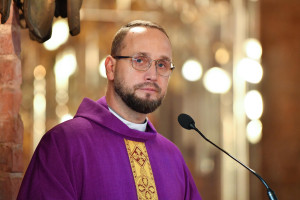The cause of the depression was a brain tumor. Professor Popiel: shoddy psychotherapy can lead to drama.

- Psychotherapy is not only about spiritual guidance, but above all, "a profession based on knowledge and evidence that can save lives," emphasizes Prof. Agnieszka Popiel.
- Psychotherapy is not always a treatment and there is no connection between the field of study and the effectiveness of psychotherapeutic work after a 4-year postgraduate training - said Dr. Łukasz Müldner-Nieckowski, national consultant in the psychotherapy department, in an interview with Rynek Zdrowia.
- The community is "throwing around" scientific evidence, accusing them of trying to corner the highly profitable training and psychotherapy market. As a result, a patient would need to be familiar with the research methodology to verify the reliability of a given psychotherapist. This is absurd.
- - As long as the only comment from prominent politicians and the experts they appoint is "there are different studies" and "psychotherapy is not only treatment, but also development", or "all approaches have the same effectiveness" - and journalists are not very inquisitive - this absurdity will deepen - says Professor Popiel sadly.
- In her opinion, since we have a deficit of psychotherapists, the training should be financed by the state.
Jacek Wykowski, Health Market: The latest draft of the psychotherapy profession bill states that the master's degree program (so-called basic education) will no longer be relevant when applying for the 4-year postgraduate training that prepares you to conduct psychotherapy. Knowing your views on this approach ( Professor Popiel on double standards for psychotherapists: "It's like removing medication leaflets" ), I'll ask right away: what real, practical harm will this cause for patients?
Prof. Agnieszka Popiel: The discussion about so-called "basic education" is just one of many serious problems with the draft law. Crucially, the law fails to protect patients from unproven methods, which—if sanctioned by the state—could be presented as "treatment." This is a fundamental threat. It also fails to meet the principle of proportionality, as required by EU law. It is very difficult to identify the public interest that would be gained from promoting/offering proven and unproven methods in treatment, financing, and standardizing educational requirements. However, the educational interest of the distinguished group surrounding the bill's authors is very easy to identify. By emphasizing this very aspect to cognitive-behavioral therapists gathered in PTTPB, or even graduates of postgraduate studies at USWPS - the Working Group working on the act, dreaming of ruling souls, "makes a face" of conflicts or breaking the unity of the "psychotherapists' community" and at the same time announces the end of the current system of education in cognitive-behavioral therapy in the name of promoting one psychotherapy (which does not exist) and the ideas of the future self-government for education.
A psychologist or physician doesn't become a psychotherapist immediately after graduation, just as a young doctor can't perform the full range of medical activities. However, their studies provide the necessary foundation – clinical knowledge, the ability to understand symptoms, and a diagnostic culture. Only then can psychotherapeutic skills be built.
Lack of this knowledge can lead to tragedy. For example, a 66-year-old woman consulted with a psychotherapist and received treatment for crises for two and a half years after the first symptoms of depression. While on therapeutic tourism, she encountered a therapist who, to her surprise, stated that:
- symptoms are atypical;
- no one cared about somatic health ("medicalization" despised by the authors of the bill);
- Diagnosing difficulties based on problems with meeting life needs and coping with the "empty nest" syndrome does not reflect the problem of the patient feeling nauseous in the morning.
Unfortunately, it took a therapist with reliable knowledge to refer the patient to specialists. The brain tumor she was diagnosed with at the time was approximately 15 centimeters in size. Unfortunately, the therapist who knew the nosological diagnosis well enough to identify the atypical nature of her symptoms was her last. The patient had seen a succession of certified specialists in various modalities, but they lacked the clinical training to detect alarming signs.
So psychotherapy is not just spiritual guidance?
Not only that. It's a profession based on knowledge and evidence that can save lives. When such arguments are raised, we hear the familiar eristic response: psychotherapy is not only about treatment but also about development. I emphasize that if a law is to regulate a profession, which entails restrictions on freedom, the benefits of its implementation must be justified by the public interest, not the interests of a group seeking to boost its self-esteem with endless power over training and the concept of a "profession of public trust."
Psychotherapists argue over definitions, cite research, and patient confusion growsThe Working Group for the Development of the Psychotherapy Profession Act states that it would be interested in reviewing data that would indicate that only psychologists or physicians can conduct psychotherapy. It believes that such data does not exist.
Data on the effectiveness and costs of methods belonging to various modalities whose representatives, according to the Working Group, will constitute the majority of the future self-government - integrative, humanistic, psychoanalytic or systemic - are incomparably poorer than data on cognitive-behavioral therapy, or they are completely absent.
The Working Group, which demands evidence of superior education among doctors and psychologists, fails to answer questions about the effectiveness of the methods it seeks to promote. I can only seriously address the misleading request for data you cited when the Working Group, in its justification for the bill, honestly answers questions regarding:
- the effectiveness and cost-effectiveness of psychotherapy: integrative (and it will stop proposing integration itself - a patchwork of researched and untested methods based on an arbitrary selection of articles), humanistic-experiential, psychoanalytical and systemic (because it itself lists these modalities in the proposed act, apart from cognitive-behavioral) in the treatment of primarily the most common mental disorders (depression, anxiety disorders, trauma- and stress-related disorders, addictions);
- the connection between the attack on education proposed by its supporters and increasing access to psychotherapy that brings measurable benefits.
On the Working Group website I see a number of selected studies and meta-analyses which are supposed to show that the practice of psychotherapy by people with various basic education is possible and helpful.
Yes, studies are cited confirming the effectiveness of... cognitive behavioral therapy (CBT). This is good, because CBT does indeed have solid scientific evidence. The problem is that this data is used to argue that "basic education doesn't matter." And this is manipulation, because it obscures the second part of the conclusions: that the method, training, adherence to protocol, etc., are what matters. Why some eminent psychologists and physicians—the "faces" of the Working Group—sign on to this approach remains a sad mystery.
So what do these studies show?
The IAPT (Talking Therapies) program and NICE recommendations demonstrate that effective methods can be taught, as we well know, even to people outside of psychology and medicine—but under supervision and for specific disorders or conditions (such as low-intensity therapy, scaled interventions, or psychological first aid). However, this does not prove the existence of "one psychotherapy" or the equal effectiveness of all approaches, as the Working Group touts. The Working Group's quotes refer to methods recommended by NICE (as this is the premise of the Talking Therapies program) for the treatment of depression and anxiety disorders. Therefore, this is not an argument that basic education is unimportant, but only that the method does matter.
Nevertheless, the Working Group's references to the results of the IAPT/Talking Therapies program are encouraging, even moving, as we have been discussing this very English program—its clinical and economic impact—for years. A lecture by its creator, Professor David Clark, at the IMPACT 24 and PTTPB conferences in 2024 is available on the PTTPB and WCCBT world confederation websites. It is also… completely ignored by the authors of the bill and current decision-makers in Poland.
Lately, I've been getting the impression that a patient in a mental crisis—in order to assess whether going to a psychotherapist isn't just about to get a "face"—must study the research methodology cited by various psychotherapists. To put it bluntly, this is absurd.
I share your sentiment with sadness. Unfortunately, this lesson has not been learned by publicly funded individuals and institutions responsible for providing accurate patient information, such as NHS Talking Therapies or NICE. As long as the only commentary from prominent politicians and the experts they appoint is "research varies" and "psychotherapy is not just about treatment but also about development," or "all approaches are equally effective"—and journalists remain inquisitive—this absurdity will continue to deepen.
In Zimbabwe, seniors have been trained in psychotherapy. It's effective.Let's assume that only physicians, psychologists, and possibly master's degrees in related fields are allowed to participate in a "postgraduate" program in psychotherapy. I'll ask a perverse question: would it be best to have a small number of highly specialized specialists, so that they would be overwhelmed by the sheer volume of cases, both mild and severe, and thus make access to help in times of crisis even more difficult?
I don't see this question as perverse. Instead, please forgive me for opening the floodgates to the demagogic arguments of the authors of the current bill. Of course, needs outweigh resources. In any system. In medicine/state care, this is a perennial ethical dilemma. Should we give everyone equal treatment, or should we ensure that at least some truly benefit? In 2008, based on economic data, the English introduced not a profession law but the government's IAPT program – mass training of psychotherapists, but not "generally" – only methods assessed by NICE as effective in treating the most common disorders that cause the highest social costs – primarily depression in adults, children, and adolescents, anxiety disorders, and PTSD.
At the other end - referring to basic education - a perfect example is the grandmothers (sic) - therapists in Zimbabwe - one of the most interesting prevention programs.
So it is possible after all?
These are laypeople, but trained in previously researched psychotherapeutic interventions in a country with a dire shortage of specialists. Are they effective? Yes, provided we know for whom and under what conditions. What did they use? Methods developed by psychologists—in this case, well-structured problem-solving therapy.
How do we know it's effective?
Because it's been researched (published in the top medical journal, the Lancet). But does this mean that these women—the Zimbabwean grandmothers—should be given a profession of public trust? No. It means that, in a time of shortage of specialists, they are successfully using previously researched methods.
Speaking of grandmothers, mine used to say that poor people can't afford to buy junk. Poland can't afford legally mandated junk in psychotherapy either. As Professor Bogdan Zawadzki writes in his article "Polish Treachery," published on the website of the Polish Psychological Association, " the law proposes a broad increase not so much in patients' access to psychotherapy, but in actual access for non-specialists to patients ."
Mathematician as psychotherapist: it's possible in AustriaAustria has a legally sanctioned pathway that allows graduates of non-psychology majors, such as economics or mathematics, to enter psychotherapy training, although it is very rigorous. It's said that, on a less direct basis, such opportunities also exist in the United Kingdom. In your opinion, have these countries passed laws that harm their citizens?
Answering this question requires emphasizing the diversity of legal solutions across Europe – we discuss them in the EABCT article. It also requires understanding the types of law, context, and consequences of regulation. England is a good example – it's called "soft regulation." There are two types of regulation there: statutory regulation applies to physicians – psychiatrists and psychologists, while psychotherapists (more broadly than physicians and psychologists) are registered with the Professional Standards Authority for Health and Social Care (PSA). This "soft regulation" applies to education in many strands of psychotherapy and allows for their development. This solution is closest to the "register bill" proposed by the Polish Society of Therapists (PTTPB) a year ago.
It's important to emphasize the separation of broader education from public funding for treatment in the UK. The latter is expected to be consistent with NICE recommendations, and education in methods with documented effectiveness is supported by the state through the IAPT program. Patients, informed about the types of therapy and recommendations, always have a choice.
Returning to the question about Austria, many countries have less-than-ideal solutions. But we can also look at them differently.
Since the Austrian Psychotherapy Act does not include the cluster/modality/integration trend, but only the other four, does this country want to deprive its citizens of education in such a valuable "modality" as the Polish Working Group wants?
This is just an example of how focusing only on who starts training, without taking into account how it is conducted, what skills are developed there, what qualifications it gives and whether (and under what conditions) they guarantee patient safety, and finally what the economic consequences will be, only obscures the picture.
And in the project being discussed in Poland? The Working Group's multimodal selection of the "cherries on the cake" of regulations available in Europe is extremely careful.
In Austria, legislators reportedly assumed that in a profession based on interpersonal relationships, candidates' diverse life and professional experience is a huge asset, something a psychology degree alone doesn't guarantee. They argued that what makes a good psychotherapist is primarily personality predispositions, emotional maturity, and the capacity for self-reflection, not the degree completed. They concluded that long hours of self-therapy are key to assessing professional suitability. I've encountered opinions that this approach is downright charlatanism. Is that the right term?
Yes, that's the right term, though it can be softened—it depends on the definition of psychotherapy we adopt. The same factors (personality predispositions, emotional maturity, and the capacity for self-reflection) also determine being a good teacher, doctor, or simply a good person. Regarding long hours of self-therapy as a key element of professional fitness for all those using psychotherapy to treat disorders, it's like an oncologist undergoing their own chemotherapy. To put it bluntly—in an age of effective self-help manuals and apps—would they also undergo long hours of psychotherapy?
The profession of psychotherapist: there are willing applicants, but training costs a fortune. Does it require government support?Germany has introduced specialized psychotherapy studies (Bachelor's and Master's) that provide direct preparation for the profession. Perhaps this is a good path for Poland?
The Germans have conducted an experiment on their own organism, the measurable effects of which on improving mental health and the economic aspect still need to be assessed, at least along the lines of the English, and the cultural context taken into account. This hasn't happened, so it's certainly too early to say whether this would be the right solution for Poland. However, please note that even in the German model, we're talking about academic education. Meanwhile, the proposed law on the psychotherapy profession in Poland involves establishing a new profession without any scientific foundation and cutting it off from the sources of formal academic education – psychological/medical (but with the key argument that it should bring scientifically substantiated benefits) – and instead expanding access and penalizing the use of methods arbitrarily reserved and defined by the self-government planned by the Working Group.
Apparently, the shortage of specialists stems from the fact that becoming a psychotherapist requires spending 60,000-80,000 złoty, not from a lack of applicants. Perhaps the government needs to step in and somehow subsidize this scarce profession?
The state should finance the training of psychotherapists, because psychotherapy with proven effectiveness is an obligation towards people with mental disorders and an investment that pays off for everyone.
The English did this long ago in the IAPT program cited above—using a rather uncomplicated formula, but with complex execution. This yielded measurable and excellent results. First, an assessment of demand—epidemiological studies on the prevalence of mental disorders, including an assessment of the costs associated with absenteeism and presenteeism. These studies in Poland are quite good, including EZOP studies and ZUS data. Then, based on research on the effectiveness of effective methods, independent HTA bodies such as NICE formulate recommendations for the use of psychotherapy. The next step is training therapists primarily in these specific methods to increase patient access to potentially effective therapies, followed by rigorous monitoring of effects, analysis of limitations, and reliable information on the types, possibilities, and limitations of "talking therapies."
Unfortunately, this bears no resemblance to the Polish GR proposal—the reverse of the IAPT. The authors' motivations are easy to understand.
So what is this really about?
It is a desperate fight to guarantee the status quo - where in the name of ensuring a diversity of approaches and original, non-empirical and wishful interpretations of data on the effectiveness of these methods - the fate of patients, the duration of therapy, and the public funds allocated for it become the least important.
Perhaps that's why there's still no specialization program to fill this gap. It's also surprising why so many psychologists, while supporting the Working Group's bill, are "suicidal" in opposing the Psychology Profession Act proposed by the Polish Psychological Association. This strategy differs from that of resident physicians, but perhaps they, having experience with the operation of the medical chamber, better understand the risks to patients resulting from the poor legislation and defend its clear provisions.
Copyrighted material - reprint rules are specified in the regulations .
rynekzdrowia

















